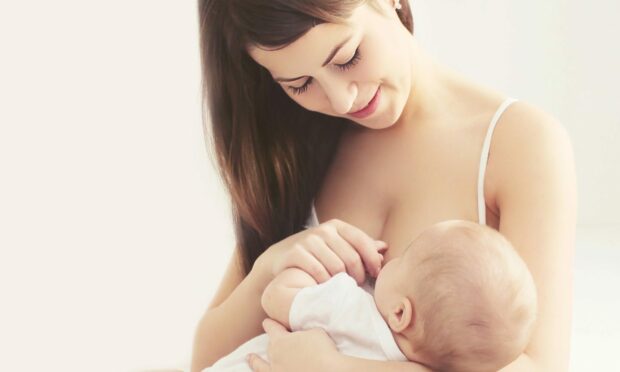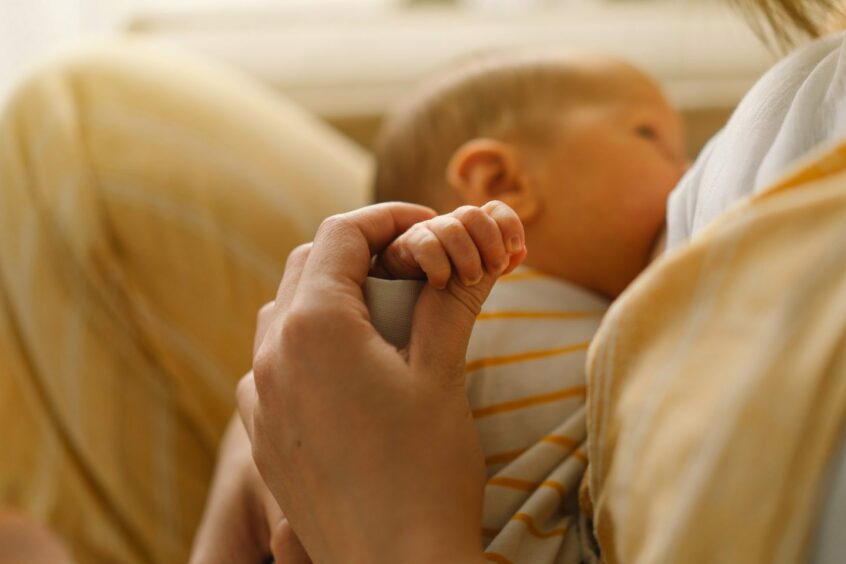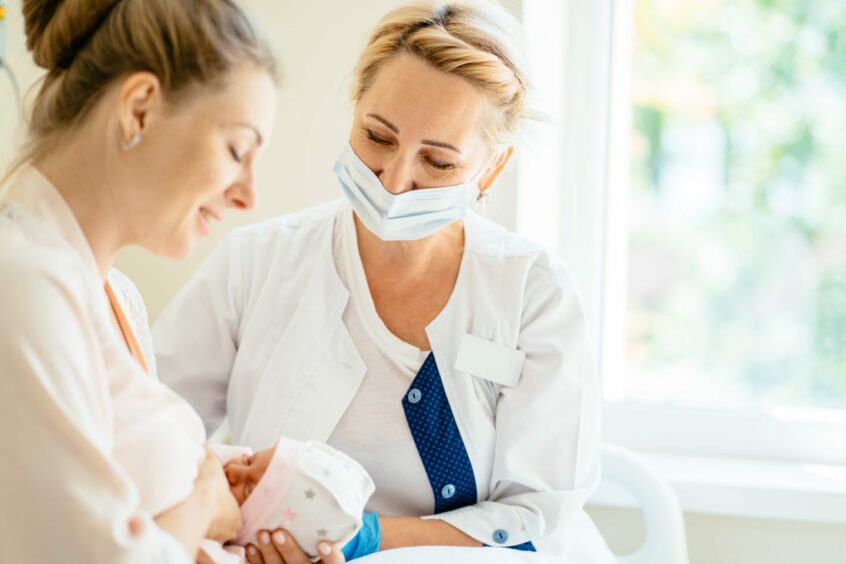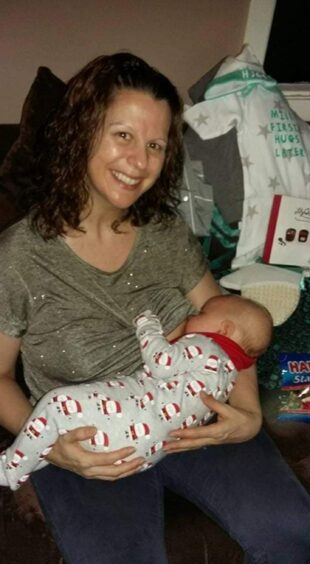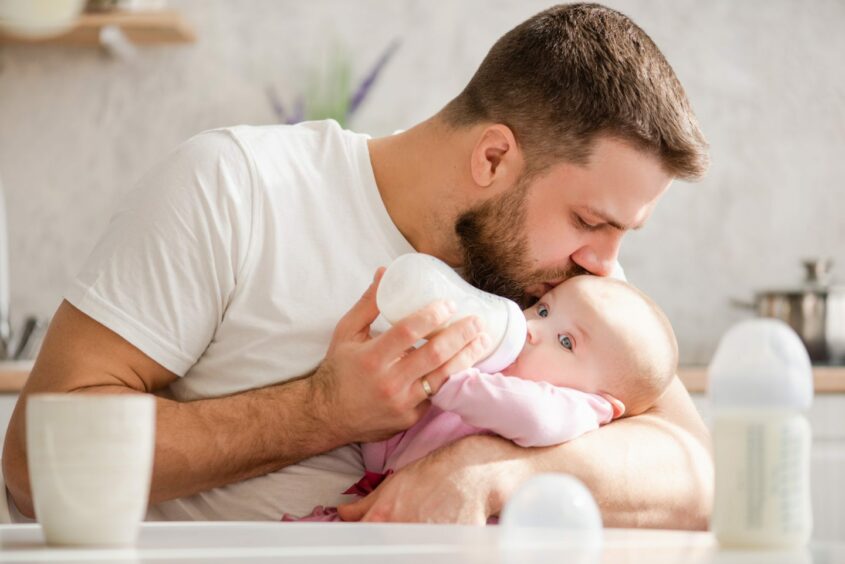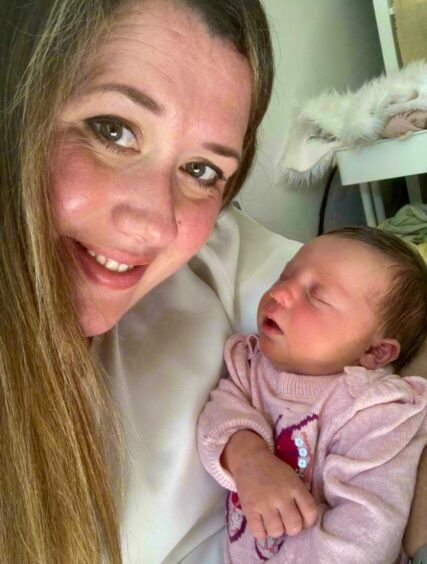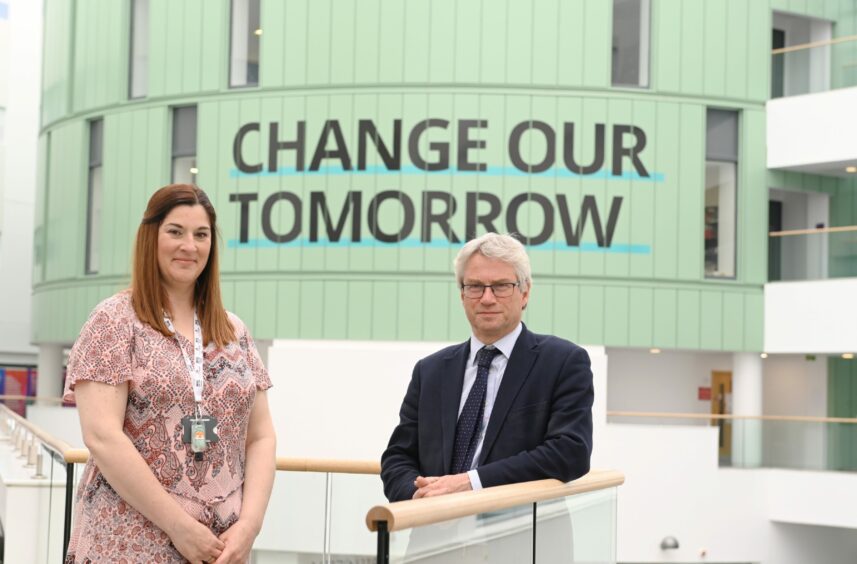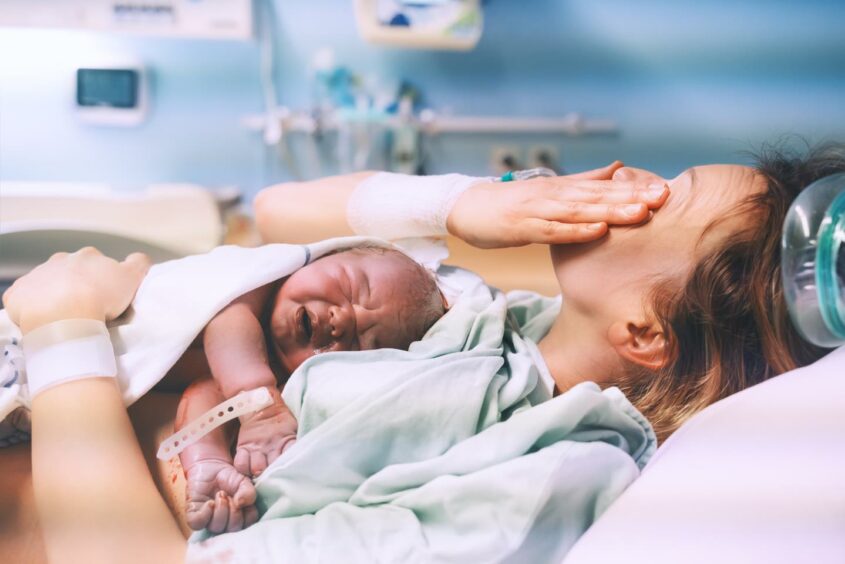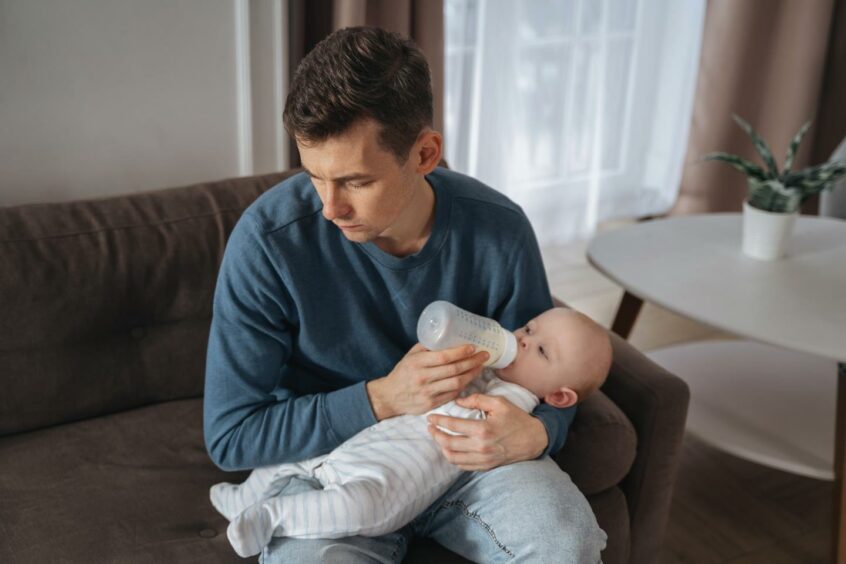The image of a mother breastfeeding her child should not be considered controversial.
Indeed the depiction of a babe suckling at the breast has been immortalised in stone, with many a sculpture depicting the bond over the passing centuries.
The latest statistics show that breastfeeding rates continue to increase in Scotland, with 66% of babies born in 2020/21 breastfed for at least some time after their birth.
Inequality remains however, with babies born to mothers in more deprived areas, younger mothers, and those of white Scottish ethnicity, least likely to be breastfed.
The World Breastfeeding Week movement (WBW) was launched 30 years ago, in a bid to generate public awareness and support for breastfeeding.
For this WBW, we spoke to both mothers and experts to find out how we can change the narrative surrounding feeding, and help women to feel empowered in their own decisions.
Laura Henderson, advocate of natural term breastfeeding
Self-employed Laura Henderson, who lives with her family in Torphins, was elated to fall pregnant after trying to conceive for three years.
She is now five years into her breastfeeding journey with her son Zack, having first set out to breastfeed for one year.
Although Laura never expected to breastfeed for as long, she believes the decision is right for her family.
“Milk teeth are called exactly that for a reason, because once children get their adult teeth they lose their latch,” said Laura.
“It’s just nature, we still co-sleep and Zack still feeds through the night.
“It’s not for everyone. But we had such a tricky start, I’ve always believed that for as long as Zack needs these boobs, he can have them.
Laura was “adamant” she was going to breastfeed and soaked up as much information as possible during pregnancy.
Babies need fed, and we need to recognise that modern day society puts huge pressure on new mums
But having attended NHS antenatal classes, she felt an honest depiction was not given of breastfeeding.
“A knitted boob got passed around, and I remember thinking it just wasn’t realistic,” said Laura.
“I think we need to be talking about the difficulties and the commitment needed.
“I was lucky to already know about this due to running baby massage classes, where there was a lot of talk about feeding and the fourth trimester in general.”
Following a difficult birth, Laura’s start to breastfeeding was not what most parents envisage.
She was able to syringe colostrum which is the first form of breastmilk, before a midwife helped latch Zack to the breast.
“I think what happened is that as the milk came down, Zack coughed and my breast was covering his nose,” said Laura.
“He turned a dusky colour, but very quickly the midwife calmly patted him on the back and he was fine.
“I was told we were free to go home, but I was very adamant that things weren’t OK because my child wasn’t feeding, partly due to swelling on his head.
“I had tried for three years to make this little man, I was adamant I was staying in hospital to get the right support.
“To be honest, because I had straight up said to a male doctor that I wanted to breastfeed, I felt like I had permission from higher up to stay, whereas two days can be the maximum for a lot of folk.”
With skin to skin and numerous positions, breastfeeding was established.
“I felt I had the support because I asked for it,” said Laura.
“I was 38 when I had Zack. I thought to myself, If I want this to work then I’m staying in hospital to do it.”
Laura has never experienced any judgement when feeding in public, and will let Zack decide when the time comes to stop breastfeeding.
“A lot of people still feed their toddlers, but you don’t see it because they’re feeding at bedtime,” said Laura.
“At times I parent by the breast. It can help tantrums, connection, relaxation and sleep.
“I’ve never said to him, when will you stop?”
Laura believes formula has its place, particularly for the modern lifestyle where parents often don’t have a support network.
“Babies need fed, and we need to recognise that modern-day society puts huge pressure on new mums,” she said.
“La Leche League and the National Childbirth Trust are both charities, and offer free support and advise.
“If lactation consultants were made available and went round seeing parents, I think breastfeeding rates would increase because people would be given that knowledge.
“Breastfeeding is a huge commitment; that is not putting onus or guilt on people who choose not to breastfeed or can’t.
“I’ve never had a night out or a night away since having my son, and for me that’s OK.
“It’s doing what works for each family.”
Arielle Ball, Breastfeed Scotland
It was the challenges of motherhood which saw Arielle seek out further knowledge of breastfeeding, and she is now an International Board Certified Lactation Consultant (IBCLC.)
Breastfeed Scotland is a private practice consultancy, which supports a wide range of families in both breast and bottle feeding.
Arielle, who lives in Oldmeldrum, would like to see more IBCLC’s working within the NHS, where she feels lack of the most up-to-date knowledge can be an issue.
“I think the peer support scheme within the NHS is absolutely fantastic,” said Arielle, who is mum to two boys.
“I really want to build bridges between private and public services.”
Arielle supports parents across Scotland, and believes that access to information is key.
“Mothers already know about the benefits of breastfeeding,” she said.
“What they need to be taught is how to breastfeed in the first place.
“Some of the information provided is really outdated. We need antenatal education on how to get the best position for the best latch.
“NHS staff work incredibly hard. But if your midwife tells you one thing and your health visitor tells you something else, what are you meant to do with that information?
“There needs to be IBCLCs in some of the top positions, who can help in training and education of fellow staff.
“Informed is best. If you don’t have the right information, you can’t make a choice.
“Being informed is being empowered.”
Kate McBrien, mum of two
Kate, who lives in Pitmedden, is currently on maternity leave with her second child.
She chose to bottle feed from the outset after her experience of breastfeeding first time round led to her collapsing at home.
Although the particular complications which Kate experienced are uncommon, she believes there needs to be more honesty when discussing the challenges of breastfeeding.
At the time of the birth of her first child, there was little advocacy for bottle feeding within the maternity setting.
“At first I had planned to bottle feed but in the months leading up to the birth of my first child, I had this overwhelming urge to try and breastfeed,” said Kate.
“I felt breastfeeding was really pushed as being the best option for my baby.
“I had complications in my first pregnancy and all over the waiting areas in the hospital there seemed to be nothing but guidance on breastfeeding, there seemed to be very little on anything else.
“I had friends who had breastfed and had outwardly made it seem very easy. I didn’t realise how difficult it could be until friends opened up to me about their own journeys.”
Following the birth of her daughter, Kate struggled with breastfeeding and was advised to cup feed instead.
Women are being sent home without someone talking them through their options, and not always seeing if babies are properly feeding yet
“Whilst our experience seems to be an uncommon one, unfortunately despite having a baby who was very keen to feed from the breast, no matter what we tried, I could not express a single drop of milk,” said Kate.
“We were advised to cup feed, which my baby took to really well.
“But unfortunately my baby’s saliva infected me so badly, that within 48 hours of being discharged from hospital I developed such a bad infection that I collapsed at home and temporarily lost the use of my legs.
“This ended our breastfeeding journey immediately.”
The experience saw Kate’s confidence falter, especially when around other mums who were breastfeeding.
“Looking back, I think a lot of my feelings of being judged by other mums came from going to baby groups and seeing mum after mum being able to breastfeed their child,” said Kate.
“This only highlighted to me that I had “failed” my own child when so many others seemingly managed to feed theirs so easily.
“But ultimately it was me judging my own ability to be a good mum.
“In those first few months you are so sleep deprived, emotional and trying to find your feet with this little person relying on you, every day can be a rollercoaster.
“Ironically, it wasn’t until my confidence grew as a mum and I saw that my child was developing into a happy, healthy and confident little person, that my decision of how to feed her hadn’t affected that, that I realised we are all on our own journey and feeding is like anything else; you do the best you can but fed is absolutely best.”
Now confidently bottle feeding her second child, Kate believes mothers need to be better informed prior to being discharged after giving birth.
“Women are being sent home without someone talking them through their options, and not always seeing if babies are properly feeding yet,” said Kate.
“I only realised further into my motherhood journey just how difficult breastfeeding can be, because the mum friends I met opened up to me.
“Breastfeeding is a wonderful, albeit at times challenging journey, but bottle feeding has worked well for our family.
“My husband and daughter have been able to help with feeding our baby right from the very beginning. This has created memories for our family which we will cherish forever.
“Bottle fed doesn’t have to be a bad thing and your feeding journey does not define you as a mum.”
Emma Williams, advanced public health practitioner and manager of Breastfeeding Peer Support Service for NHS Grampian
For Emma Williams, the time has come to change the culture surrounding breastfeeding and speak to parents prior to their baby’s arrival.
The Breastfeeding Peer Support Service provides one to one support in the community, group support, advice via email, phone, the Near Me video consultant service and support on postnatal wards.
Breastfeeding is a hugely complicated topic, and the biggest thing we need to do as a country is change the culture and the conversation
The service drastically altered during the pandemic with staff redeployed to other areas, and volunteers unable to visit the wards.
But Emma is now on a mission to offer more help and guidance than ever before, having recently supported Robert Gordon University in signing up to the Breast Feeding Friendly Scotland scheme.
“We offer mum to mum support, delivered by trained volunteers who have breastfed themselves,” said Emma.
“This isn’t in the place of a healthcare professional, it’s a complimentary add on.”
A Grampian-wide infant feeding survey, which was carried out last year by the Grampian Maternal and Infant Nutrition Group, showed that parents want to know where they can access feeding support and information relatively early on.
“The survey showed that parents want that information antenatally, so I’m really passionate about having that conversation,” said Emma.
“We want to be asking mums, for example, what support network do they have around them?
“One of the biggest things for me is community support.
“If I’m a mum who wants to breastfeed, I want my friends and my family working together to support me.
“Breastfeeding is a hugely complicated topic, and the biggest thing we need to do as a country is change the culture and the conversation.
“This is not about demonising formula.
“It’s about providing all the information to support breastfeeding, to make for an easier conversation.”
The Breastfeeding Friendly Early Years Scheme could next be piloted in the Grampian area, with both private and local authority nurseries alongside childminders signing up for online learning around breastfeeding.
Having already been piloted in Lanarkshire, it could see “cultural changes” with toy bottles removed from the home corner of early years environments.
“It’s all about the way we have this conversation, rather than causing conflict,” said Emma.
“We have increased the amount of supporters on the ward postnatally, my aspiration is to have support available seven days a week.
“Of course there’s already the infant feeding team with midwifes who specialise in infant feeding.
“But volunteers can also sit with you and ensure you are connected to the peer support service from the offset.
“We know from the survey that it can be about that immediate postnatal support.
“I think as mums we already have guilt over various things. Breastfeeding shouldn’t be another thing, it’s about being well informed.
“It’s about changing the culture for the better.”
For more information, head to www.birthingrampian.scot.nhs.uk or www.nhsgrampian.org/your-health/healthy-living/breastfeeding
